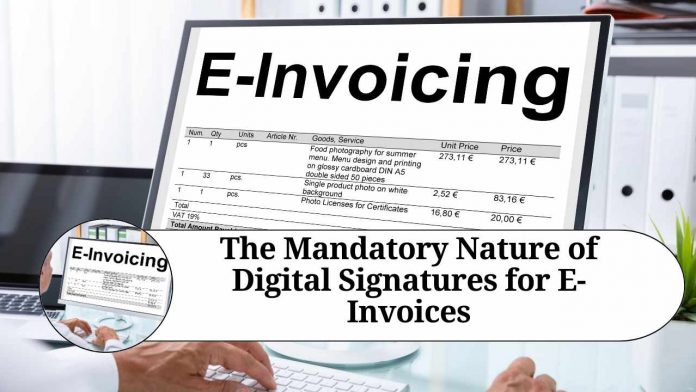Recent Updates on e-Invoicing:
10th May 2023
The implementation of the 6th phase of e-invoicing has been recently announced by the Central Board of Indirect Taxes and Customs (CBIC). Starting from 1st August 2023, businesses with an annual turnover of ?5 crore or more in any financial year since 2017-18 will be mandated to issue e-invoices. This initiative is a significant move by the government to encourage the use of digital transactions and facilitate the shift towards a digital economy.
Introduction
In the digital era, where technology is advancing at an unprecedented pace, traditional paper-based processes are gradually being replaced by more efficient and secure digital alternatives. One such transformation is the implementation of electronic invoicing (e-invoicing), which streamlines the invoicing process and enhances accuracy, speed, and cost-effectiveness. However, amidst this transition, the question arises: Is a digital signature mandatory for e-invoices? In this blog post, we will explore the significance of digital signatures in e-invoicing and shed light on why they are considered an essential requirement.
What is a Digital Signature?
A digital signature is a cryptographic mechanism that provides authenticity, integrity, and non-repudiation to electronic documents, including e-invoices. It is a unique electronic stamp that verifies the identity of the sender and ensures that the contents of the document remain unaltered during transmission. Digital signatures use public-key infrastructure (PKI) technology, where a private key is used to sign the document, and a corresponding public key is used to verify the signature.
The Importance of Digital Signatures in E-Invoices:
- Authentication and Integrity: A digital signature ensures the authenticity and integrity of an e-invoice. It validates the identity of the sender and guarantees that the invoice has not been tampered with during transit. This instills confidence in the recipient, reducing the risk of fraud or unauthorized modifications.
- Legal Compliance: Many countries and regulatory bodies require the use of digital signatures for e-invoices to comply with legal and regulatory frameworks. These signatures serve as evidence of the authenticity and integrity of the document and hold the same legal weight as a handwritten signature on a paper invoice.
- Non-Repudiation: Digital signatures provide non-repudiation, meaning that the sender cannot later deny sending the e-invoice or claim that its contents were altered. This attribute is crucial in legal disputes, ensuring that both parties are bound by the terms and conditions mentioned in the invoice.
- Enhanced Security: E-invoices often contain sensitive financial information. By using digital signatures, the confidentiality of this data is safeguarded, as the signature encrypts the document, making it nearly impossible for unauthorized parties to access or modify the information.
- Efficient Workflow: With the use of digital signatures, the process of sending and receiving e-invoices becomes faster and more efficient. There is no need for manual signing, printing, or scanning of documents, which saves time, reduces administrative costs, and minimizes the chances of errors or delays.
Conclusion
In the realm of e-invoicing, where reliability, security, and legal compliance are paramount, digital signatures play a crucial role. They ensure the authenticity, integrity, and non-repudiation of e-invoices, bolstering trust between trading partners and facilitating efficient business processes. Although the requirement for digital signatures in e-invoices may vary across jurisdictions, adopting this practice voluntarily can bring numerous benefits to businesses, including increased efficiency, reduced risk of fraud, and improved compliance with legal and regulatory frameworks. As digital transformation continues to shape the business landscape, embracing the use of digital signatures for e-invoices becomes not just a requirement but also a smart and strategic choice.
Read more useful content:
Frequently Asked Questions (FAQs)
Q1: Is a digital signature mandatory for e-invoices?
A: The requirement for a digital signature in e-invoices depends on the country and its specific regulations. In many jurisdictions, digital signatures are indeed mandatory for e-invoices to ensure authenticity, integrity, and compliance with legal and regulatory frameworks.
Q2: What is the purpose of a digital signature in an e-invoice?
A: The primary purpose of a digital signature in an e-invoice is to provide authentication, integrity, and non-repudiation. It verifies the identity of the sender, ensures that the contents of the document remain unaltered during transmission, and prevents the sender from denying or disputing the invoice at a later stage.
Q3: How does a digital signature enhance the security of e-invoices?
A: A digital signature enhances the security of e-invoices by encrypting the document and making it virtually impossible for unauthorized parties to access or modify the information. This ensures that the sensitive financial data contained in the e-invoice remains confidential and protected.
Q4: Are there any legal implications for not using a digital signature in e-invoices?
A: Depending on the jurisdiction, there may be legal implications for not using a digital signature in e-invoices where it is mandatory. Non-compliance with such regulations may lead to penalties, invalidated invoices, or challenges in legal disputes. It is important to consult the specific laws and regulations governing e-invoicing in your country or region.
Q5: Can a handwritten or scanned signature be used as an alternative to a digital signature in e-invoices?
A: In most cases, handwritten or scanned signatures are not considered as valid alternatives to digital signatures in e-invoices. Digital signatures provide stronger security, non-repudiation, and compliance with legal requirements. It is advisable to adopt the use of digital signatures to ensure the authenticity and integrity of e-invoices.
Q6: What technologies are used for implementing digital signatures in e-invoices?
A: Digital signatures in e-invoices are typically implemented using public-key infrastructure (PKI) technology. PKI relies on cryptographic algorithms to generate unique keys for signing and verifying the signatures. This technology ensures the security and reliability of the digital signature process.
Q7: Are there any exceptions or industries exempt from using digital signatures in e-invoices?
A: There may be specific exemptions or industries that are not required to use digital signatures in e-invoices, depending on the regulations of each country. However, it is important to note that digital signatures offer numerous benefits in terms of security, efficiency, and compliance, and voluntarily adopting them can be advantageous for businesses across industries.
Q8: Can electronic invoicing platforms facilitate the integration of digital signatures?
A: Yes, electronic invoicing platforms often provide features to facilitate the integration of digital signatures. These platforms may offer built-in digital signature functionality or support integration with external digital signature providers. It is advisable to choose an invoicing solution that meets the digital signature requirements of your country or region.
Q9: How can I ensure the validity and legality of digital signatures in e-invoices?
A: To ensure the validity and legality of digital signatures in e-invoices, it is important to comply with the specific laws and regulations of your jurisdiction. This may involve obtaining digital certificates from trusted certification authorities and following the technical and procedural requirements outlined by the regulatory bodies.
Q10: Is it worth voluntarily adopting digital signatures in e-invoices even if they are not mandatory in my country?
A: Yes, voluntarily adopting digital signatures in e-invoices can bring numerous benefits, such as enhanced security, improved efficiency, reduced risk of fraud, and better compliance with legal and regulatory frameworks. It demonstrates a commitment to best practices and can foster trust with your trading partners, even in the absence of a legal requirement




















